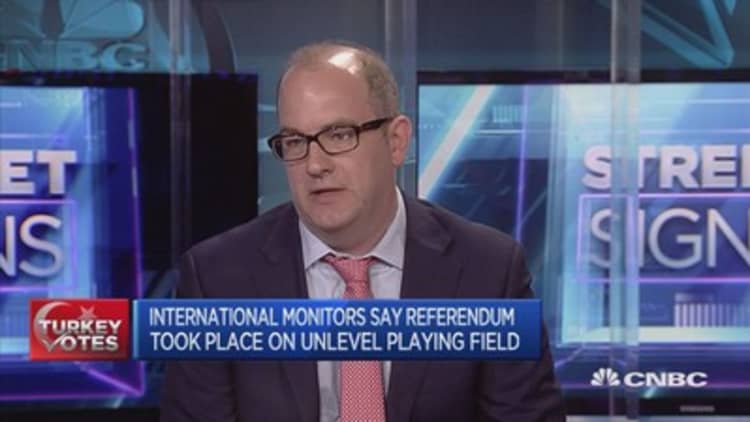The recent referendum result in Turkey has raised concerns about the future of the country's democracy.
The question for investors is whether or not Turkey remains a market in which to invest.
The referendum held at the weekend grants the country's president Recep Tayyip Erdoğan expanded powers.
Turkey's ISE National 100 stock market closed at 91,374 after the result, though it is currently trading below 90,900. Year to date, it is up around 16 percent.
Meanwhile, the Turkish lira made some gains against the dollar in the run-up to the referendum and strengthened following the result. It is currently trading around 3.67 Turkish Lira per dollar.
John Bates, head of emerging markets fixed income corporate research at PineBridge Investments, says currency markets had largely priced in the vote, but warned that threats to the central bank's independence and the country's banking regulations were a big risk for investors.
"The Turkish banking sector is probably the best regulated banking sector in emerging markets, up until now. If that loses its independence, then we could see some volatility," he told CNBC's Street Signs on Tuesday.
"A lot of these institutions are heavily reliant on external financing, dollar-funding, hard currency funding. I think that is a risk certainly that we could see going forward."

Bates added that, in the short-term, the referendum result was positive for investors as it removed some uncertainty, but in the longer term it could be a concern. However, he said Turkish assets are "absolutely" worth investing into.
"From a corporate perspective, the institutions are very strong. For example, Koç Group, which is one of the largest conglomerate companies in Turkey, continues to produce excellent results across various sectors," he said.
"The financial sector still has very strong capital adequacy, low NPL ratios, so we're starting from a strong base in terms of corporate risk and corporate fundamentals. In terms of valuations, there is still some value."
However, Stephanie Lindeck, economist at Julius Baer, was much more critical about the impact of the referendum on the future of the economy.
"In the long run we doubt that the associated stability will be enough to calm investors' concerns over what is pretty much a totalitarian state. Furthermore, Turkey remains highly vulnerable to interest-rate hikes, a strong USD and the rise in oil prices. We therefore reiterate our out-right negative stance on bonds, equities and the lira going forward" she said in a press comment.
"With the 'Yes' in the constitutional referendum Turkey stepped back decades in time. The associated stability is a false friend, which will eventually turn away foreign investment and leave Turkey weaker than before."

